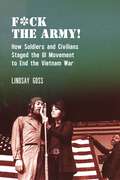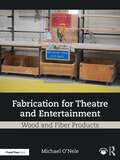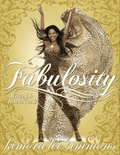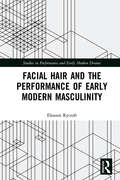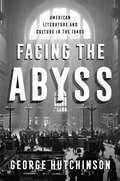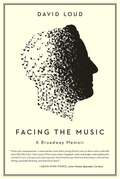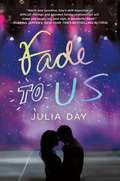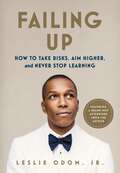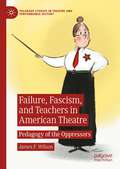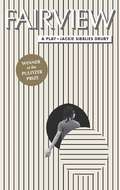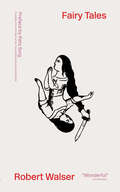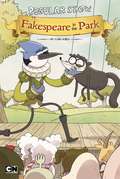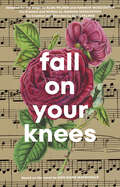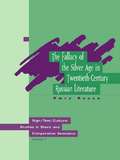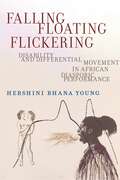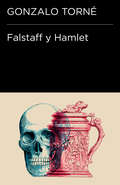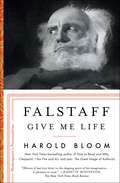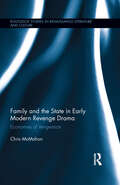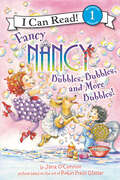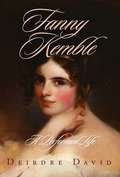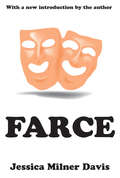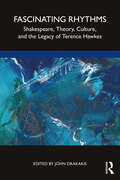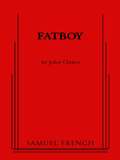- Table View
- List View
F*ck The Army!: How Soldiers and Civilians Staged the GI Movement to End the Vietnam War (Performance and American Cultures #7)
by Lindsay GossReveals the theatrical dimensions of civilian support for the revolutionary GI Movement of the 1960s-70sPerformance played a role both crucial and complicated in the antiwar activism of the 1960s and 1970s. As soldiers and civilian actors, activists, and celebrities worked together to end the Vietnam War, their theatrical acts of solidarity and resistance connected liberation struggles across the lines of race, gender, enlisted status, and nationality.F*ck The Army! offers the first, fully narrated history of the FTA, an antiwar variety show featuring Jane Fonda that played to tens of thousands of active-duty troops over the course of nine months in 1971. From its very conception, the civilian-led show was directed towards the project of making visible the growing antiwar movement organized by GIs, inspired by but also acting as a rebuttal to the increasingly out-of-touch USO tours presented by Bob Hope. Through an analysis of the FTA’s tactical performances of solidarity and resistance, Lindsay Goss brings into view the theatrical dimensions of the GI movement itself, revealing it as representative of the revolutionary and theatrical politics and tactics of the period. The volume highlights how, due to the movement’s subsequent historical erasure, a renewed anti-theatricality emerged from the 1960s and became a potent feature of contemporary political discourse.The author’s deft methodological and analytic strategies, in tandem with her elegantly accessible style demonstrate how seemingly little-known performance practices can activate consequential understandings of what we thought we knew about the recent past. At the same time, she encourages essential conversations about pressing contemporary issues that demand our attention. At its core, F*ck The Army! reveals the fundamentally theatrical character of radical activism when it seeks to challenge the status quo.
Fabrication for Theatre and Entertainment: Wood and Fiber Products (Fabrication for Theatre and Entertainment)
by Michael O'NeleFabrication for Theatre and Entertainment: Wood and Fiber Products is a complete reference guide to the process of working with wood products for scenic and properties construction for theatre and entertainment arts.This book covers lumber product characteristics, layout methods for fabricators, and the tooling and machinery used to fabricate with lumber products. While there are references that demonstrate common scenic construction methods, furniture joinery, and commercial construction, this book also introduces methods for calibrating machinery and accurately configuring them for various construction tasks, helping entertainment fabricators ensure a repeatable, accurate finished product. Readers will be introduced to a wide range of tools and techniques, which will allow them to tackle both common issues and new challenges creatively and effectively.The book is intended as a resource for technical designers, technical directors, shop managers, master carpenters, and prop or scenic fabricators working in various parts of the entertainment industry, including film, television, theatre, themed entertainment, exhibits, and immersive installation art.To access full-color versions of the artwork, visit www.routledge.com/9781032593197.
Fabulosity: What It Is & How to Get It
by Kimora Lee SimmonsFabulosity (n): 1: a state of everything that is fabulous 2: a quality ascribed to that which expresses glamour, style, charisma, power, and heartKimora Lee Simmons knows what it means to have fabulosity -- and she wants to tell you how to get it.In this empowering new book, Kimora -- a top model, wife of hip-hop legend Russell Simmons, mother to two daughters, a national media presence, and president and creative director of the multimillion-dollar Baby Phat company -- shares her personal secrets of success and fabulosity.Kimora knows that in today’s ultracompetitive world, it’s not enough for women just to be smart or dress well. With too much to do and competition everywhere, the savvy woman must know how to combine feminine glamour with professional power, business ambition with personal values, and confidence with heart. Kimora is the living picture of all these things. What are Kimora’s secrets to achieving her goals, her signature fabulosity? One is her ability to identify and build upon her own unique talents and strengths. In Kimora’s case, she brilliantly combined the two worlds she knows best -- the high fashion and hip-hop scenes -- to create Baby Phat, her ultrasuccessful hip-hop inspired lifestyle brand.How do you uncover and develop your own special talents? Kimora shares her step-by-step guide to achieving your wildest dreams, including her 16 laws of success, which cover everything you need to become the woman you want to be.Whether you’re college-educated or street smart, just starting out or at the top of your game, Fabulosity has something to say to you. Learn how to cultivate Power, Independence, Confidence, and Positivity in everything you do, whether it’s finding Mr. Right, snagging that corner office, or rocking the latest fashion trend. Packed with useful lessons and Kimora’s personal tips, this book will be your instruction manual to empowering yourself, turning your individual talents into permanent success, and unleashing your inner fabulosity.
Facial Hair and the Performance of Early Modern Masculinity (Studies in Performance and Early Modern Drama)
by Eleanor RycroftFacial Hair and the Performance of Early Modern Masculinity is the first full-length critical study to analyse the importance of beards in terms of the theatrical performance of masculinity. According to medical, cultural, and literary discourses of early modern era in England, facial hair marked adult manliness while beardlessness indicated boyhood. Beards were therefore a passport to cultural prerogatives. This book explores this in relation to the early modern stage, a space in which the processes of gender formation in early modern society were writ large, and how the uses of facial hair in the theatre illuminate the operations of power and politics in society more widely. Written for scholars of Early Modern Theatre and Theatre History, this volume anatomises the role of beards in the construction of onstage masculinity, acknowledging the challenges offered to the dominant ideology of manliness by boys and men who misrepresented or failed to fulfil bearded masculine ideals.
Facing the Abyss: American Literature and Culture in the 1940s
by George HutchinsonMythologized as the era of the “good war” and the “Greatest Generation,” the 1940s are frequently understood as a more heroic, uncomplicated time in American history. Yet just below the surface, a sense of dread, alienation, and the haunting specter of radical evil permeated American art and literature. Writers returned home from World War II and gave form to their disorienting experiences of violence and cruelty. They probed the darkness that the war opened up and confronted bigotry, existential guilt, ecological concerns, and fear about the nature and survival of the human race. In Facing the Abyss, George Hutchinson offers readings of individual works and the larger intellectual and cultural scene to reveal the 1940s as a period of profound and influential accomplishment.Facing the Abyss examines the relation of aesthetics to politics, the idea of universalism, and the connections among authors across racial, ethnic, and gender divisions. Modernist and avant-garde styles were absorbed into popular culture as writers and artists turned away from social realism to emphasize the process of artistic creation. Hutchinson explores a range of important writers, from Saul Bellow and Mary McCarthy to Richard Wright and James Baldwin. African American and Jewish novelists critiqued racism and anti-Semitism, women writers pushed back on the misogyny unleashed during the war, and authors such as Gore Vidal and Tennessee Williams reflected a new openness in the depiction of homosexuality. The decade also witnessed an awakening of American environmental and ecological consciousness. Hutchinson argues that despite the individualized experiences depicted in these works, a common belief in art’s ability to communicate the universal in particulars united the most important works of literature and art during the 1940s. Hutchinson’s capacious view of American literary and cultural history masterfully weaves together a wide range of creative and intellectual expression into a sweeping new narrative of this pivotal decade.
Facing the Music: a Broadway memoir
by David LoudMusical Director and arranger David Loud, a legendary Broadway talent, recounts his wildly entertaining and deeply poignant trek through the wilderness of his childhood and the edge-of-your-seat drama of a career on, in, under, and around Broadway for decades. He reveals his struggle against the ravages of Parkinson's and triumphs repeatedly. This memoir is also a remarkable love letter to music. Loud is the 'Ted Lasso' of the theater business, ever the optimist!&“&‘Music has consequences,&’ a wise teacher once told a young David Loud; so does a story well-told and a life fully-lived. I lost count of how many times I laughed, cried, and laugh-cried reading this wonderful, wry, intimate, and inspiring book. David wields a pen like he wields a baton, with perfect timing, exquisite phrasing, and enormous heart.&” — David Hyde Pierce, actor, Frasier, Spamalot, Curtains &“Beautifully written, filled with vivid details, braided with love and loss and wit and the perspective of someone with an utterly unique story to tell." -- Lynn Ahrens, lyricist, Ragtime, Once on This Island, Anastasia &“Luminous and surprising, an extremely honest memoir of a life lived in the world of Broadway musicals, by one of the theatre&’s most gifted conductors. I can&’t think of another book quite like it.&” -- John Kander, composer, Cabaret, Chicago, New York, New York Unforgettably entertaining and emotionally revealing, Loud is pitch-perfect as he describes his path to the podium, from a stage-struck kid growing up at a school devoted to organic farming and mountain climbing, to the searing formative challenges he faces during adolescence, to the remarkable behind-the-scenes stories of his Broadway trials and triumphs. Skilled at masking his fears, Loud achieves his dream until one fateful opening night, when in the midst of a merry, dressing room celebration, he can no longer deny reality and must suddenly, truly, face the music.
Fade to Us
by Julia DayJulia Day's Fade to Us is a story about found families, the bond of sisterhood, and the agony and awe of first love.Brooke's summer is going to be EPIC— having fun with her friends and a job that lets her buy a car. Then her new stepfather announces his daughter is moving in. Brooke has always longed for a sibling, so she’s excited about spending more time with her stepsister. But she worries, too. Natalie has Asperger’s--and Brooke's not sure how to be the big sister that Natalie needs.After Natalie joins a musical theater program, Brooke sacrifices her job to volunteer for the backstage crew. She’s mostly there for Natalie, but Brooke soon discovers how much she enjoys being part of the show. Especially sweet is the chance to work closely with charming and fascinating Micah--the production’s stage manager. If only he wasn't Natalie's mentor...When her summer comes to an end, will Brooke finally have the family she so desperately wants--and the love she's only dreamed about?
Failing Up: How to Take Risks, Aim Higher, and Never Stop Learning
by Leslie Odom Jr.Leslie Odom Jr., burst on the scene in 2015, originating the role of Aaron Burr in the Broadway musical phenomenon Hamilton. Since then, he has performed for sold-out audiences, sung for the Obamas at the White House, and won a Tony Award for Best Leading Actor in a Musical. But before he landed the role of a lifetime in one of the biggest musicals of all time, Odom put in years of hard work as a singer and an actor.With personal stories from his life, Odom asks the questions that will help you unlock your true potential and achieve your goals even when they seem impossible. What work did you put in today that will help you improve tomorrow? How do you surround yourself with people who will care about your dreams as much as you do? How do you know when to play it safe and when to risk it all for something bigger and better?These stories will inspire you, motivate you, and empower you for the greatness that lies ahead, whether you’re graduating from college, starting a new job, or just looking to live each day to the fullest.
Failure, Fascism, and Teachers in American Theatre: Pedagogy of the Oppressors (Palgrave Studies in Theatre and Performance History)
by James F. WilsonThis timely and accessible book explores the shifting representations of schoolteachers and professors in plays and performances primarily from the twentieth and twenty-first centuries in the United States. Examining various historical and recurring types, such as spinsters, schoolmarms, presumed sexual deviants, radicals and communists, fascists, and emasculated men teachers, Wilson shines the spotlight on both well-known and nearly-forgotten plays. The analysis draws on a range of scholars from cultural and gender studies, queer theory, and critical race discourses to consider teacher characters within notable education movements and periods of political upheaval. Richly illustrated, the book will appeal to theatre scholars and general readers as it delves into plays and performances that reflect cultural fears, desires, and fetishistic fantasies associated with educators. In the process, the scrutiny on the array of characters may help illuminate current attacks on real-life teachers while providing meaningful opportunities for intervention in the ongoing education wars.
Fairview: A Play
by Jackie Sibblies DruryWinner of the 2019 Pulitzer Prize for Drama. <p><p> Grandma's birthday approaches. Beverly is organizing the perfect dinner, but everything seems doomed from the start: the silverware is all wrong, the carrots need chopping and the radio is on the fritz. What at first appears to be a family comedy takes a sharp, sly turn into a startling examination of deep-seated paradigms about race in America.
Fairy Tales: Dramolettes
by Robert Walser Reto Sorg James Reidel Daniele PantanoThree mini-plays by the German wunderkind and asylum-dweller. Fairy Tales gathers the unconventional verse dramolettes of the Swiss writer Robert Walser. Narrated in Walser's inimitable, playful language, these theatrical pieces overturn traditional notions of the fairy tale, transforming the Brothers Grimm into metatheater, even metareflections. Snow White forgives the evil queen for trying to kill her, Cinderella doubts her prince and enjoys being hated by her evil stepsisters; the Fairy Tale itself is a character who encourages her to stay within the confines of the story. Sleeping Beauty, the royal family, and its retainers are not happy about being woken from their sleep by an absurd, unpretentious, Walser-like hero. Mary and Joseph are taken aback by what lies in store for their baby Jesus.
Fakespeare in the Park
by Gabe SoriaHast thou heard of Shakespeare in the Park? Bro, this is so much cooler. Mordecai and Rigby are trying to slack off again, only this time it's about to ruin The Park's Shakespeare festival. This clever novel presents a light-hearted story of how Mordecai and Rigby from Regular Show try their hardest to get out of work and in the process wreak havoc on the festival in The Park. As usual, they must rely on their friends to help them cleanest up thy mess.
Fall On Your Knees
by Hannah MoscovitchIn an adaptation of the classic Canadian novel, this epic play follows three generations of a Cape Breton Island family in a tale of forbidden love, inescapable bonds, and devastating betrayals, all while harbouring secrets that threaten to shatter the family entirely. At the dawn of the twentieth century, a young piano tuner named James Piper and thirteen-year-old Materia Mahmoud fall into a whirlwind romance. As their family grows, the couple is strained by dark revelations that lead to dangerous consequences. Their headstrong daughters Kathleen, Frances, Mercedes, and Lily grow up haunted but fiercely connected in ways they must learn to fully understand. A richly layered story by turns both heartbreaking and joyous, Fall On Your Knees is a vivid portrayal of love, desire, and the quest for truth and redemption.
Fallacy of Silver Age
by Omry RonenIn this study, Ronen critically examines the term "Silver Age", which over the years has gained such wide currency among historians and connoisseurs of 20th century Russian culture. The author traces the origin and the controversial development of what he condemns as an influential misnomer. Ronen sets out to debunk the myth that attributes invention of the term to Nikolai Berdiaev, and in turn traces this widely used catchword in the critical idiom from an abscure, avante-garde manifesto to the present day. He lays to rest the use of the term which he sees as the most misleading constituent of Russia's contemporary cultural self-awareness and self-assessment.
Falling, Floating, Flickering: Disability and Differential Movement in African Diasporic Performance (Crip #7)
by Hershini Bhana YoungInsists on the importance of embodiment and movement to the creation of Black socialityLinking African diasporic performance, disability studies, and movement studies, Falling, Floating, Flickering approaches disability transnationally by centering Black, African, and diasporic experiences. By eschewing capital’s weighted calculus of which bodies hold value, this book centers alternate morphologies and movement practices that have previously been dismissed as abnormal or unrecognizable. To move beyond binaries of ability, Hershini Bhana Young traverses multiple geohistories and cultural forms stretching from the United States and the Mediterranean to Sierra Leone, Nigeria, and South Africa, as well as independent and experimental film, novels, sculptures, images, dance, performances, and anecdotes. In doing so, she argues for the importance of differential embodiment and movement to the creation and survival of Black sociality, and refutes stereotypic notions of Africa as less progressive than the West in recognizing the rights of disabled people. Ultimately, this book foregrounds the engagement of diasporic Africans, who are still reeling from the violence of colonialism, slavery, poverty, and war, as they gesture toward a liberatory Black sociality by falling, floating, and flickering.
Falstaff y Hamlet (Colección Endebate #Volumen)
by Gonzalo TornéUn fascinante ensayo sobre dos personajes fundamentales de Shakespeare que no terminan de encajar en su contexto. Hay una clase de personajes que tienen una función narrativa distinta a la del resto: no tienen carne ni sangre, están hechos de palabras como el resto de personajes, pero parecen pertenecer a otro plano de la realidad: saben muchas cosas y actúan como un motivador contratado para dinamizar la obra. El lector reconoce en su perfil desdibujado que tienen un pie fuera (por enfermedad, por mayor experiencia, por pertenecer a un rango social inferior) del escenario común donde actúan el resto de figuras: su función narrativa consiste en propiciar la acción, en cometerla, en actuar como directores de escena vicarios. En este audaz ensayo Gonzalo Torné, tan brillante novelista como perspicaz crítico, propone una lectura de Shakespeare en la que Falstaff y Hamlet inauguran esa estirpe, que más tarde recogerán autores como Henry James, Iris Murdoch o John Coetzee.
Falstaff: Give Me Life (Shakespeare's Personalities #1)
by Harold BloomFrom Harold Bloom, one of the greatest Shakespeare scholars of our time comes &“a timely reminder of the power and possibility of words [and] the last love letter to the shaping spirit of Bloom&’s imagination&” (front page, The New York Times Book Review) and an intimate, wise, deeply compelling portrait of Falstaff—Shakespeare&’s greatest enduring and complex comedic characters.Falstaff is both a comic and tragic central protagonist in Shakespeare&’s three Henry plays: Henry IV, Parts One and Two, and Henry V. He is companion to Prince Hal (the future Henry V), who loves him, goads, him, teases him, indulges his vast appetites, and commits all sorts of mischief with him—some innocent, some cruel. Falstaff can be lewd, funny, careless of others, a bad creditor, an unreliable friend, and in the end, devastatingly reckless in his presumption of loyalty from the new King. Award-winning author and esteemed professor Harold Bloom writes about Falstaff with the deepest compassion and sympathy and also with unerring wisdom. He uses the relationship between Falstaff and Hal to explore the devastation of severed bonds and the heartbreak of betrayal. Just as we encounter one type of Anna Karenina or Jay Gatsby when we are young adults and another when we are middle-aged, Bloom writes about his own shifting understanding of Falstaff over the course of his lifetime. Ultimately we come away with a deeper appreciation of this profoundly complex character, and this &“poignant work&” (Publishers Weekly, starred review) as a whole becomes an extraordinarily moving argument for literature as a path to and a measure of our humanity. Bloom is mesmerizing in the classroom, wrestling with the often tragic choices Shakespeare&’s characters make. &“In this first of five books about Shakespearean personalities, Bloom brings erudition and boundless enthusiasm&” (Kirkus Reviews, starred review) and his exhilarating Falstaff invites us to look at a character as a flawed human who might live in our world.
Fame, Glory, and Other Things on My To Do List
by Janette RallisonIt's been a week and a half since Brendan broke up with me, but I try not to think about him. He only crosses my mind when I see Lauren and him walking around the hallways holding hands, or when they eat lunch in the cafeteria sitting so close together you'd think they were Siamese twins, or when I cry myself to sleep every night. But besides all of that, I'm doing really well. On the night I met Jordan, I wasn't thinking about Brendan at all. After my shift at Wal-Mart was over, I walked out into the parking lot debating the merits of boy names for girls instead of dwelling on the fact that it was Friday night and Brendan and Lauren were out somewhere practicing their Siamese twins routine.
Family and the State in Early Modern Revenge Drama: Economies of Vengeance (Routledge Studies in Renaissance Literature and Culture)
by Chris McMahonIn this book, McMahon considers Early Modern revenge plays from a political science perspective, paying particular attention to the construction of family and state institutions. Plays set for close study are The Spanish Tragedy, Hamlet, The Revenger’s Tragedy, The Malcontent and The Duchess of Malfi. The plays are read as unique events occupying positions in historical process concerning the privatisation of the family (by means of symbolism and concrete household strategies such as budgeting and surveillance) and the subsequent appropriation of the family and its methods by the state. The effect is that family becomes an unofficial organ of the state. This process, however, also involves the reform of the state along lines demanded by the private family. McMahon’s critical method, derived from the theory of Bourdieu, Bataille, and Girard, maps capital transactions to reveal emotionally charged, often idiosyncratic responses to issues of shared concern. Such issues include state corruption, the management of women, the performance of roles according to gender, the uses of surveillance, and the ethics of sacrifice.
Fancy Nancy: Bubbles, Bubbles, and More Bubbles! (I Can Read Level 1)
by Jane O'ConnorFancy Nancy and her class are going to see The Big Bubble Show!Nancy and Bree can’t wait to go. But when Bree gets sick and has to miss the show, Nancy decides to put on a bubble show of her own. Will Nancy and her classmates be able to put on the best bubble show ever?From the beloved New York Times bestselling author-illustrator team Jane O’Connor and Robin Preiss Glasser, Fancy Nancy: Bubbles, Bubbles, and More Bubbles is a Level One I Can Read, perfect for children learning to sound out words and sentences.
Fanny Kemble
by Deirdre DavidA ForeWord magazine Book of the Year for 2007Charismatic, highly intelligent, and splendidly talented, Fanny Kemble (1809-93) was a Victorian celebrity, known on both sides of the Atlantic as an actress and member of the famous Kemble theatrical dynasty, as a fierce opponent of slavery despite her marriage to a wealthy slave owner, as a brilliantly successful solo performer of Shakespeare, and as the author of journals about her career and life on her husband's Georgia plantations. She was, in her own words, irresistible as a "woman who has sat at dinner alongside Byron . . . and who calls Tennyson, Alfred."Touring in America with her father in the early 1830s, Kemble impulsively wed the wealthy and charming Philadelphia bachelor Pierce Butler, beginning a tumultuous marriage that ended in a sensational divorce and custody battle fourteen years later. At the time of their marriage, Kemble had not yet visited the vast Georgia rice and cotton plantations to which Butler was heir. In the winter of 1838, they visited Butler's southern holdings, and a horrified Kemble wrote what would later be published on both sides of the Atlantic as Journal of a Residence on a Georgian Plantation. An important text for abolitionists, it revealed the inner workings of a plantation and the appalling conditions in which slaves lived. Returning to England after her divorce, she fashioned a new career as a solo performer of Shakespeare's plays and as the author of memoirs, several travel narratives and collections of poems, a short novel, and miscellaneous essays on the theater. For the rest of her life, she would divide her time between the two countries.In the various roles she performed in her life, on stage and off--abolitionist, author, estranged wife--Kemble remained highly theatrical, appropriating and subverting nineteenth-century prescriptions for women's lives, ever rewriting the roles to which she was assigned by society and inheritance. Hers was truly a performed life, and in the first Kemble biography in twenty-five years to examine that life in its entirety, Deirdre David presents it in all its richness and complexity.
Farce (Transaction Series In Humor Ser.)
by Jessica Milner DavisFarce has always been relegated to the lowest rung of the ladder of dramatic genres. Distinctions between farce and more literary comic forms remain clouded, even in the light of contemporary efforts to rehabilitate this type of comedy. Is farce really nothing more than slapstick-the "putting out of candles, kicking down of tables, falling over joynt-stools," as Thomas Shadwell characterized it in the seventeenth century? Or was his contemporary, Nahum Tate correct when he declared triumphantly that "there are no rules to be prescribed for that sort of wit, no patterns to copy; and 'tis altogether the creature of imagination"? Davis shows farce to be an essential component in both the comedic and tragic traditions. Farce sets out to explore the territory of what makes farce distinct as a comic genre. Its lowly origins date back to the classic Graeco-Roman theatre; but when formal drama was reborn by the process of elaboration of ritual within the mediaeval Church, the French term "farce" became synonymous with a recognizable style of comic performance. Taking a wide range of farces from the briefest and most basic of fair-ground mountebank performances to fully-fledged five-act structures from the late nineteenth century, the book reveals the patterns of comic plot and counter-plot that are common to all. The result is a novel classification of farce-plots, which serves to clarify the differences between farce and more literary comic forms and to show how quickly farce can shade into other styles of humor. The key is a careful balance between a revolt against order and propriety, and a kind of Realpolitik which ultimately restores the social conventions under attack. A complex array of devices in such things as framing, plot, characterization, timing and acting style maintain the delicate balance. Contemporary examples from the London stage bring the discussion u
Fascinating Rhythms: Shakespeare, Theory, Culture, and the Legacy of Terence Hawkes
by John DrakakisAs one of the most adventurous literary and cultural critics of his generation, Terence Hawkes’ contributions to the study of Shakespeare and the development of literary and cultural theory have been immense. His work has been instrumental in effecting a radical shift in the study of Shakespeare and of literary studies. This collection of essays by some of his closest colleagues, friends, peers, and mentees begins with an introduction by John Drakakis, outlining the profound impact that Hawkes’ work had on various areas of literary studies. It also includes a poem by Christopher Norris, who worked with Hawkes for many years at the University of Cardiff, as well as work on translation, social class, the historicist and presentist exploration of Shakespearean texts, and teaching Shakespeare in prisons. The volume features essays by former students who have gone on to establish reputations in areas beyond the study of literature, and who have contributed ground-breaking volumes to the pioneering New Accents series. It concludes with Malcolm Evans’ innovative account of the migration of semiotics into the area of business. This book is a vibrant and informative read for anyone interested in Hawkes’ unique blend of literary and cultural theory, criticism, Shakespeare studies, and presentism.
Fatboy
by John ClancyJohn Clancy / 3m, 2f / Fatboy is a brutal comedy inspired by Alfred Jarry's Ubu Roi. This satire on modern America's insatiable appetites--from gobbling up 72oz. steaks to small nations--is presented as a live-action Punch and Judy show. In this fast-moving, shocking, profane, dead-on, funhouse mirror reflection of the world today, the brutish allegory known as Fatboy, along with his monstrous wife, Queen Fudgie the First, stands trial for war crimes. Despite overwhelming evidence the court refuses to convict and succumbs to Fatboy's "persuasive" tactics. / "Brazen...daring...highly entertaining." - Jason Zinoman, The New York Times
